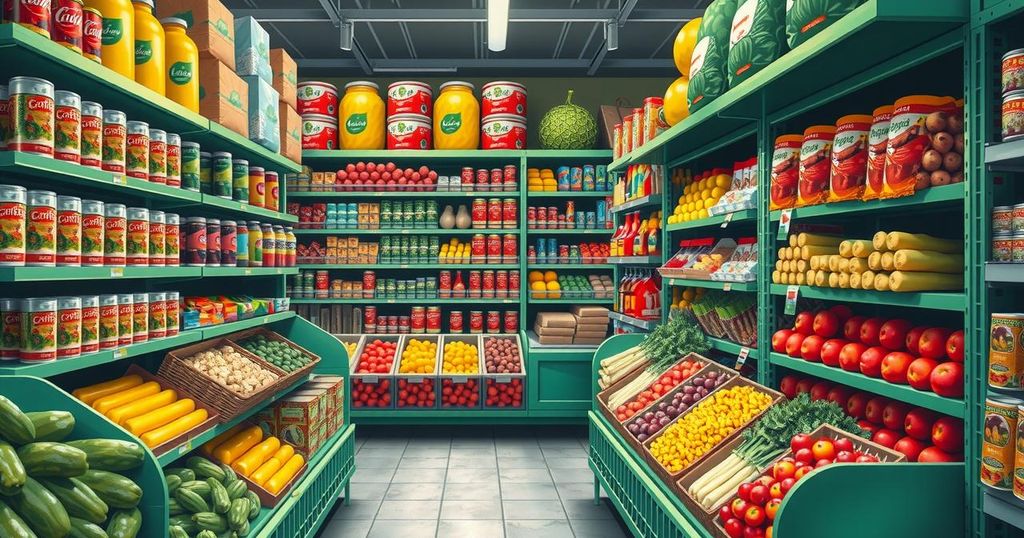Food Retailers Stand to Gain Amid Inflation Pressures in South Africa

As South Africa’s economy recovers, the food sector anticipates changes benefitting either producers or retailers. Lower interest rates and GDP growth support consumption, whereas predicted food price inflation could favor retailers. Shoprite shows strong revenue growth, Spar faces challenges, AVI adopts a cautious outlook, and Tiger Brands remains optimistic about consumer recovery.
As South Africa’s economy begins to recover, the food sector is expected to undergo significant changes. Lower interest rates, improving GDP growth, and an influx of cash from the two-pot retirement system may enhance consumer spending. This raises the question of whether food producers or retailers will be the primary beneficiaries.
Projected improvements in GDP growth, along with interest rate reductions and increased withdrawals from the two-pot savings system, are anticipated to boost consumer expenditure and food sector volumes. Meanwhile, food producers may see margin recovery and earnings enhancement due to diminished commodity price inflation.
However, as food price inflation is predicted to rise in the first quarter of 2025, food retailers may benefit more during this period. Historically, retailers often experience revaluation amid increasing food prices as they prepare for stronger relative earnings growth.
Shoprite: Competitive Advantage
Shoprite’s RSA Supermarkets have observed a 10.4% revenue increase without enhancing promotional subsidies, even in a low inflation environment. They have achieved this by fostering new loyalty partnerships and expanding their store network. Although like-for-like growth slowed to 5.4% in the first half of 2025 compared to 8% in fiscal year 2024, robust volume growth remains a positive indicator for the company’s gross and operating margin improvements.
The reduction of load shedding costs positively impacted Shoprite’s trading profit in the first half of 2025. Furthermore, with a robust balance sheet and anticipated net cash from a R2.7 billion furniture sale, Shoprite is well positioned. Despite high capital intensity requirements for sustaining double-digit earnings growth, Shoprite is regarded as a strong player in the South African food retail sector, outperforming the general retailer’s index amid market fluctuations.
Spar: Strategic Reevaluation
Spar’s potential for margin recovery and portfolio optimization looks promising; however, its recent trading update indicated weaker revenue growth in South Africa and Ireland. Spar Southern Africa reported a modest 3.4% revenue growth with a like-for-like increase of only 3%. Factors such as the closure of 13 grocery stores in the South Rand region and inconsistent supply chains in Mozambique affected sales growth.
Conversely, there was a reduction in operating losses from corporate grocery and liquor stores, attributed to better performance following the closure of inefficient stores. While the recent trading update showcased some challenges, it followed significant corporate strategy adjustments in 2024.
AVI: Cautious Expectations
AVI’s first half of 2025 results revealed a 9% increase in headline earnings per share year-on-year, despite only a 1% growth in group revenue. The profit distribution was somewhat unexpected, with divisions such as I&J, Fashion, and Personal Care underperforming forecasts, contrasted by a remarkable 44% operating profit growth within the Entyce division.
Management conveyed a tempered outlook, stating that “profit growth may not mirror the first semester” and that the following six months would likely exhibit a slowdown without improvements in the operational landscape. Despite the short-term limitations, AVI remains a quality company recognized for delivering robust returns over time, making it a viable long-term investment due to the current market pessimism being reflected in the pricing.
Tiger Brands: Optimistic Management
Tiger Brands reported a 3% revenue increase for the four months ending January 31, attributed to both volume and price inflation. Their volume growth is a result of strategic initiatives aiming to lower input costs and keep their prices relevant and affordable for consumers. As part of ongoing portfolio optimization, Tiger Brands has divested its approximately 24% equity stake in Chile’s Empresas Carozzi for about $240 million (approximately R4.4 billion). This is a strategic move as Tiger Brands focuses on refining capital allocation and growth strategies.
Looking forward, Tiger Brands has observed signs indicating that the consumer environment is starting to recover. Management has expressed optimism for the forthcoming year, focusing on sustaining both volume and profit as key priorities.
In conclusion, the South African food retail sector is poised for transformation as the economy recovers. Various companies such as Shoprite, Spar, AVI, and Tiger Brands exhibit diverse strategies to navigate emerging challenges and opportunities. Shoprite continues to lead with its significant revenue growth, while Spar recalibrates its approach amid fluctuating market dynamics. AVI maintains a cautious optimism, and Tiger Brands emphasizes its confidence in consumer recovery. This evolving landscape emphasizes the importance of strategic adaptability in responding to inflationary pressures and changing consumer behaviors.
Original Source: www.zawya.com








